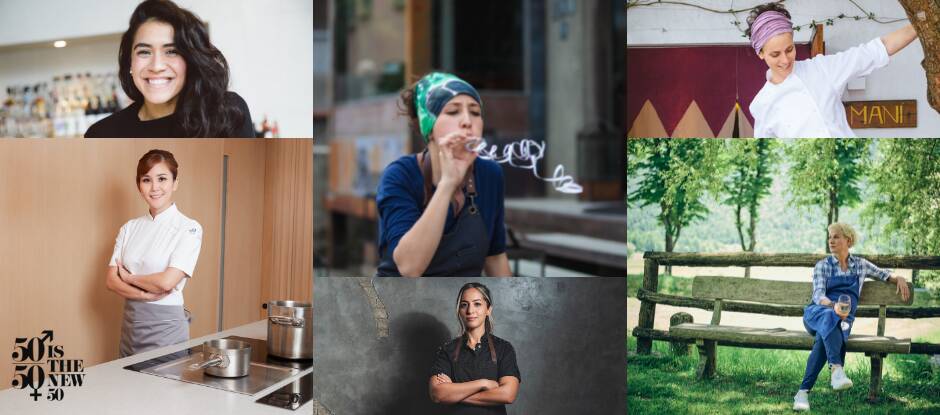This International Women’s Day, 50 Best speaks to six former winners of the Best Female Chef Award in Asia, Europe, Latin America, the Middle East and the US to get their views on women in hospitality and their words of wisdom for the next generation of female cooks
Tala Bashmi – Manama, Bahrain
Middle East & North Africa's Best Female Chef 2022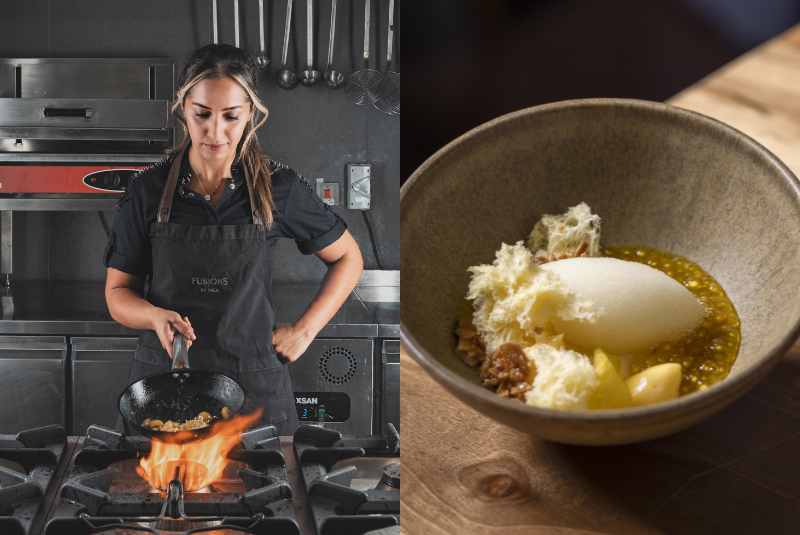
Not long before winning the Middle East & North Africa’s Best Female Chef Award, Tala Bashmi was in a state of total burn-out. The chef of Fusions by Tala in Manama, Bahrain, had made it to the final of Top Chef Middle East in 2019 but was devastated when she hadn’t won, feeling “torn apart” by what she perceived as a failure for the next two years. She’d been pushing herself for years and was suffering from “creative block and exhaustion” to the point where she questioned herself and her goals.
Then she received the call saying she’d been voted as the first-ever Best Female Chef winner at the inaugural Middle East & North Africa’s 50 Best Restaurants, which was the push she needed to persevere. “It helped me answer those questions and made me realise I am on the right path. It’s reinvigorated me,” she says. It has also strengthened her resolve and determination: “You can either keep pushing and strive to be better after defeat, or you can give up. If you keep fighting, you will be able to achieve something amazing because it’s from those downfalls and mistakes that you learn and improve.”
Bashmi says that while men are typically still paid significantly more than women in most professions in the Middle East and Gulf region, the pay gap is narrowing and women are increasingly recognised, so she sees no reason for gender to hold them back. For women hoping to enter the profession, she recommends they get a job in a restaurant and give it three to six months to see if they love it enough to handle the long hours and tough conditions. For those already committed, she says: “Fake it till you make it – believe in yourself and know your worth.” As for being a woman in a male-dominated profession, she adds: “The only thing standing in your way is yourself and how you handle a situation. Take it on the chin and work your butt off.”
Helena Rizzo – São Paulo, Brazil
The World’s Best Female Chef 2014 and Latin America’s Best Female Chef 2013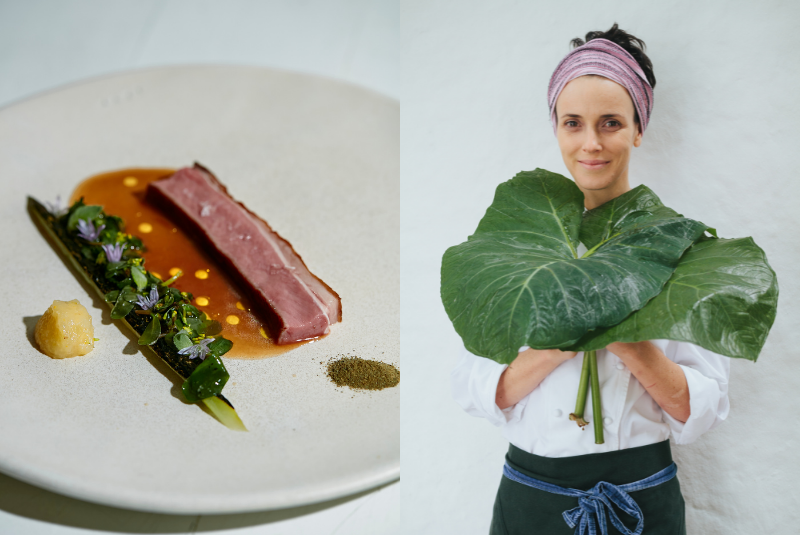
Aside from being the first year of a global pandemic, 2020 was also the year when Helena Rizzo celebrated 15 years since opening her flagship restaurant Maní, which hit the No.7 spot in last year’s special edition Latin America’s 50 Best Restaurants 2021: Pasado y Futuro list. No small feat in a city of 12 million inhabitants where restaurants open and close every month, the longevity and success of Maní are testament to Rizzo’s ability to evolve both creatively and personally, allowing the restaurant to move with the changing times.
One such personal evolution happened last month when her long-time friend and sous chef Rodrigo Rissardo left the restaurant for a new project. “In the past, when someone like Rodrigo left the restaurant, I would feel desperate; I would panic and beg them to stay,” she wrote in an Instagram post. “Over the years, I’ve learned that the kitchen is a cyclical space where people spend time before spreading their wings and developing, going after their own dreams and making room for less-experienced cooks to develop too.” That learning has also given her personal freedom. “Everyone wants the same thing – to grow,” she says. “You can get swallowed up, but don’t let yourself stagnate. A restaurant isn’t the end goal; it’s a means.”
As for women in hospitality, she recognises that gender-based awards like the Best Female Chef title, which she won in 2013 and 2014, still serve an important role in putting more women’s work on display. But times are changing and she hopes that in the near future such accolades won’t need to exist once attitudes change across society. “Everyone needs to change, including women,” she says. “We’ve been living in sexist times and we can no longer put up with things that we’ve learned to think of as normal.” She remains optimistic about the representation of women in hospitality: “Every year, there are more and more women working in kitchens. We no longer stand for abuse. Everyone is more conscious now – we’re not living in an ideal world, but we’re moving in that direction.”
Vicky Lau – Hong Kong, China
Asia’s Best Female Chef 2015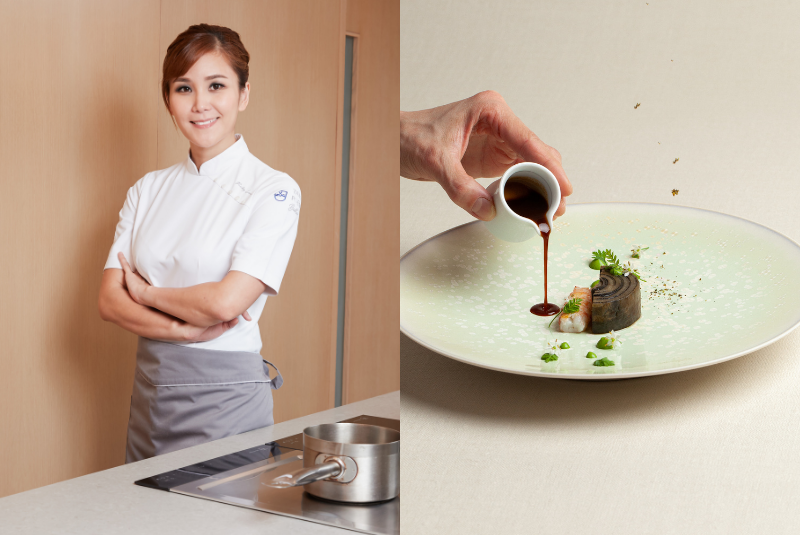
In one of the regions worst hit by the Covid-19 pandemic, Hong Kong’s chefs and restaurateurs have faced severe restrictions for more than two years, with restaurants currently banned from offering dinner service and virtually no tourism in or out of the country. Despite multiple lockdowns, problems with food supply and strict rules on opening, chef Vicky Lau has managed not only to keep her flagship Tate Dining Room alive, but also to open brand new restaurant Mora, which has just launched its six-course ‘Ode to Seaweed’ lunch menu. She says the pandemic, combined with the effect of industry awards like Asia’s 50 Best Restaurants and media coverage over the years, has actually helped raise the profile of chefs within the region.
“In a way, Covid made a lot of people realise that hospitality is an important industry – more people have put a focus on food. People aren’t able to travel so they dine out within the Hong Kong scene and they now respect chefs a lot more. The social value of a chef has changed.” When asked why Covid helped changed people’s perception of restaurants, she adds: “People realised they can’t cook!”
Since winning the Asia’s Best Female Chef title in 2015, Lau says there have been major improvements for women in hospitality in the region, with many promoted to management roles and an increase in culinary school attendance. “Quite a few women have shown how adaptable they can be throughout Covid, which also helps.” As for what else can be done to support women in hospitality, she says it’s important to “keep talking and having this kind of conversation,” not just about equality but also about sustainability and the issues that will continue to affect us all in the future. Sustainability is an area where Lau is also making great strides, reducing meat by half on her menus and introducing customers to new soy-based dishes. “These are very important topics that all blend together and it’s important to keep having these conversations.”
Daniela Soto-Innes – Lummi Island, USA
The World’s Best Female Chef 2019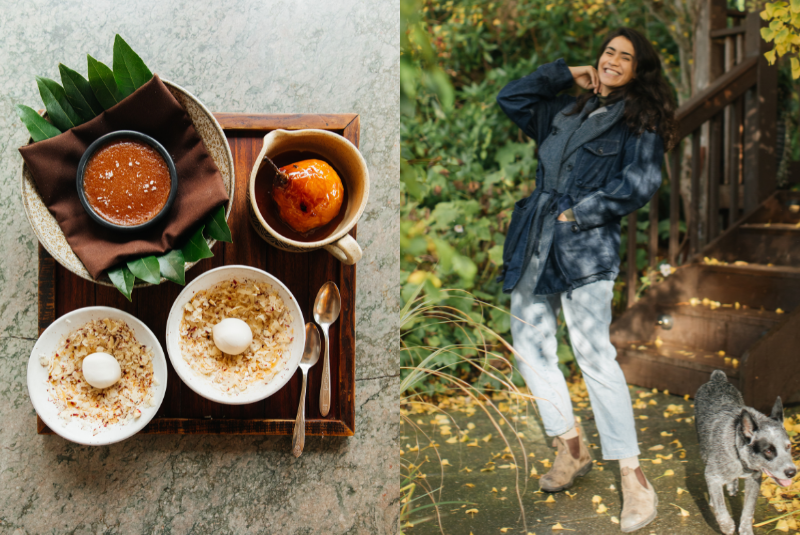
When Daniela Soto-Innes announced on Instagram that she was leaving Cosme in late 2020 after several months of closure during lockdown, many in the hospitality world were shocked – the then 30-year-old Mexican had led the restaurant to the No.22 spot in The World’s 50 Best Restaurants since co-opening it with Enrique Olvera in 2014, and had won countless awards including The World’s Best Female Chef title. She went off the grid for a while, taking a road trip across the US and Mexico for several months before settling on Lummi Island at her husband Blaine Wetzel’s restaurant, The Willows Inn. “When I left Cosme, it was too much; I was so sad. I had to take a sabbatical,” she says.
Since arriving at The Willows Inn, Soto-Innes has brought with her both her cuisine and many of her staff from Cosme and Atla, creating a total shift in culture at the restaurant. She describes the menu now as ‘Pacific Northwest meets Mexico’, with chillies, corn and herbs like hoja santa grown on the farm, and dishes such as black cod tacos with ice plant and quince. “As immigrants, we must never forget to spread our knowledge, our culture and our roots wherever we go,” she says.
While The Willows Inn has been criticised for its lack of women in senior positions, it now has a 50% female, predominantly immigrant workforce, with Soto-Innes in a creative “coaching” role alongside Wetzel and chef de cuisine Hugo Vera, sisters Estefania and Valentina Brito as sous chef and head pastry chef respectively, and former Quintonil sommelier Andrea Hernández as wine director. Soto-Innes says the secret to her long working relationship with her team is that she treats them equally and listens to them. “Every time I step into a kitchen, I talk to people the whole time and ask how they’re feeling – maybe that’s why I’ve been working with these chefs for seven years. We represent women and immigrants and queer people and sometimes just Americans who feel a bit lost.”
After winning The World’s Best Female Chef Award in 2019, Soto-Innes says she received some 3,000 messages from chefs all over the world, the majority of whom were women either asking for advice or thanking her for representing the Bipoc and Latinx community. “Ever since I first arrived in New York, I always wanted to give equal opportunities to everyone. If there was a woman with no experience, I would teach them, and the Chikis [the Brito sisters] are the best proof of that – they’re so much better than I am. Some people just don't know how to work with women, but if you treat everyone fairly then everyone can excel based on their performance.”
Ana Roš – Kobarid, Slovenia
The World’s Best Female Chef 2017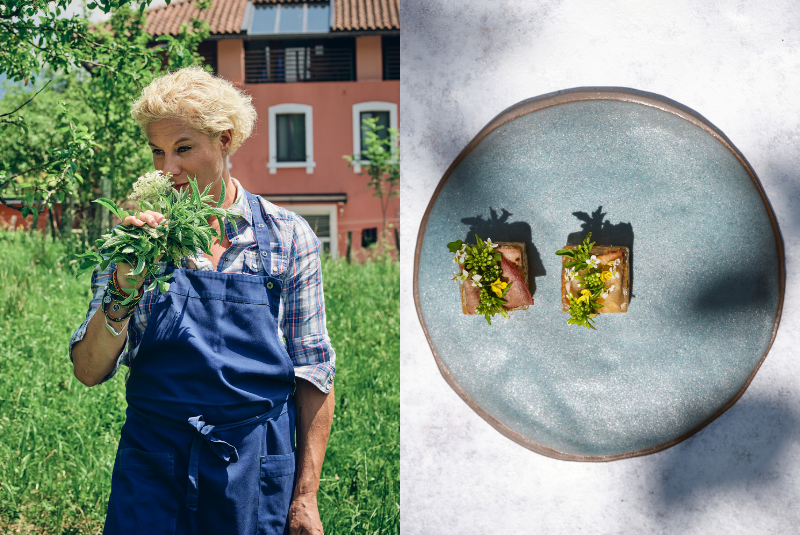
Ten years ago, Slovenian Ana Roš was the first woman to join Cook it Raw, an annual gathering of top chefs to create unique dining experiences and discuss the possibilities of the culinary world. She recounts that at the time, she felt excluded by the men in the group, who she says went off to play billiards without telling her where they were going. “There was this weird feeling of ‘what is a girl doing here?’” she says, before explaining how far the industry has moved on since then. “Today, this kind of thing would never happen.”
While Roš recognises that equality is far from achieved, she says that things are changing “rapidly” and that it’s important for leaders to create a better working environment for everyone, not just women. Arriving back from vacation before reopening Hiša Franko on 18th March, she says she gave her entire team two months of paid leave so that they could spend time with their own families and return refreshed. “It’s an investment and people say I’m crazy but we work so much. If I can do it, and if people can travel back home, be with their families, go to the beach and have a piece of normality, I will invest in that. Now I see everybody shining, beautiful and happy to be back.”
As for her advice for women in hospitality, the winner of The World’s Best Female Chef Award 2017 says resilience is key. “Never give up. There will be very brutal and very difficult moments, but think about your dreams. Nothing in life that you really want is impossible, so in difficult moments look at yourself in the mirror and say to yourself ‘I can do it’.”
Marsia Taha – La Paz, Bolivia
Latin America’s Rising Star Female Chef 2021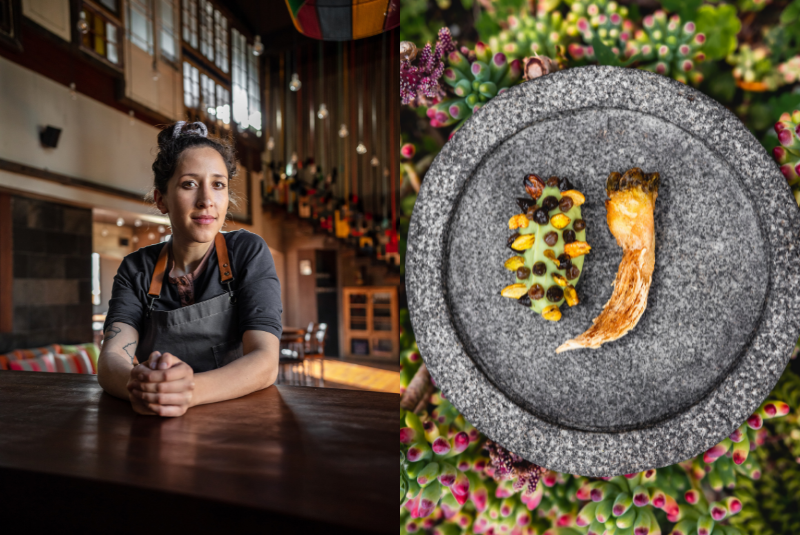
While the global conversation often revolves around the lack of women at the helm in restaurant kitchens, in Bolivia women are running the show, with a boom in female-led contemporary kitchens in the capital, La Paz. According to Gustu head chef Marsia Taha, who won the Latin America’s Rising Star Female Chef Award in 2021, while there are still more male head chefs overall, many of the most innovative modern restaurants are run by women, including Gabriela Prudencio of Propiedad Pública, Valentina Arteaga of Phayawi, Alexandra Melean of Popular Cocina Boliviana and Paola Gonzales of Ali Pacha. “In Latin America, like in many places, women have always been the ones behind the more traditional cuisine,” she says. “It’s incredible to see so many women behind innovative contemporary restaurants in Bolivia.”
At Gustu, which took the No.36 spot in last year’s ranking of the top 100 Latin American restaurants over the history of the list, Taha insists on a kitchen made up of 50% women and 50% men. “It’s always about creating a balance,” she says. “Men and women have the same abilities in terms of creativity, organisation, everything, so it’s about identifying those talents and having a balanced kitchen. We want to incentivise women but not to the point where we’re hiring only women – the ideal scenario is to diversify our kitchens.” She says that by believing in her female chefs and empowering them to speak up, she has helped them grow confidence and believe in themselves too.
Since winning the Rising Star award and also being selected as part of the inaugural 50 Next list, Taha says she gained visibility, which she is using not only to highlight Bolivian fine dining but also its traditional cuisine and biodiversity. As part of her Sabores Silvestres initiative, she is working with indigenous communities to understand pre-hispanic recipes and techniques, which she soon hopes to put on the table at Gustu. “It’s very important to show Bolivia as creative, innovative and diverse, but on the other hand it’s beautiful to show our culture, which has so much history behind it. People have opened their eyes and that gives me the power to show my culture and Bolivian gastronomy.”
‘50/50 is the new 50’ is a content series created by 50 Best and supported by S.Pellegrino with the shared aim of promoting equality, inclusivity and balance in the hospitality sector and beyond.
Follow 50 Best on Instagram, Facebook, Twitter and YouTube for the latest news, features and initiatives in support of the global restaurant industry.
